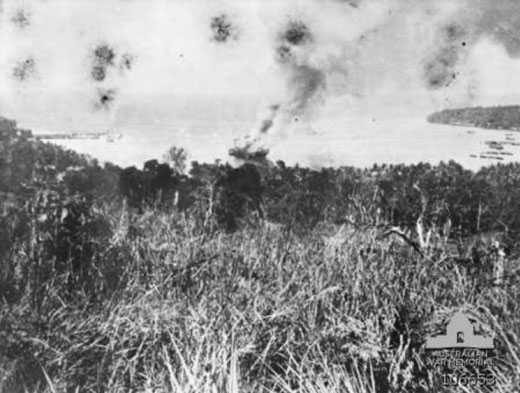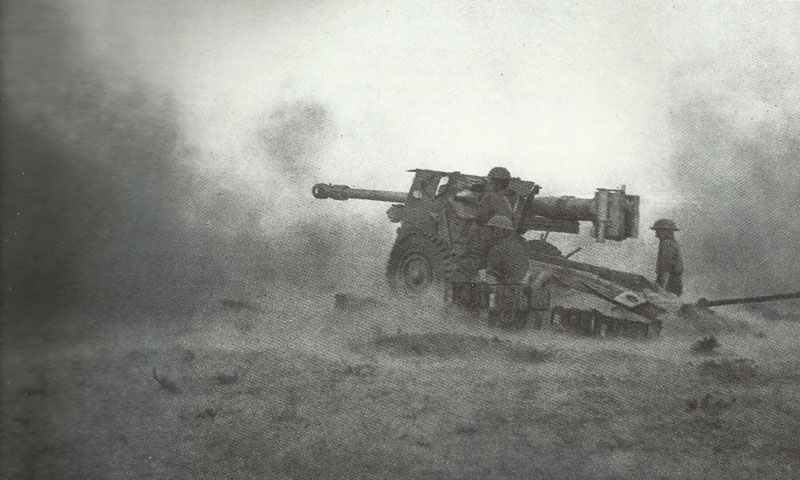Air Operations, Europe
There is an unsuccessful night raid on Norwich.
BOMBER COMMANDDaylight Ops:
- With fighter escort, 24 Venturas attack the Rotterdam docks hitting at least 6 ships and starting a fire in a dockside warehouse.
- There are no losses.
- St Nazaire is hit by 323 aircraft including 179 Wellingtons, 52 Halifaxes, 50 Lancasters and 7 Mosquitos.
- Most of the bombs fall on the port area.
- 1 Halifax and 1 Lancaster are lost.
- 7 aircraft lay mines off St Nazaire and there are 5 OTU sorties.
- There are no losses.
Air Operations, New Guinea
- V Bomber Command B-17s, B-24s, and B-25s mount numerous individual attacks against a wide range of targets.
- 18 D3As 'Val' dive bombers escorted by 39 A6M Zeros attack Allied bases around Oro Bay at 1115 hours. In response, 31 US fighters are scrambled at the last minute, of which 49th Fighter Group P-38s down 2 'Vals' and 11 Zeros near Oro Bay between 1145 and 1215 hours. 1 P-40 is lost with its pilot and Japanese bombs sink 2 small ships and damage a new wharf.
Air Operations, Solomons
5 AirSols P-38s and 1 F4U (of 8 of each sent) mount a low-level attack against the Japanese Navy seaplane bases at Poporang and in the Shortland Islands. An Japanese destroyer encountered east of the Shortland Islands is also attacked and seriously damaged.
[Air Operations, Tunisia
- NASAF B-26s attacking Gabes Airdrome find that base has been abandoned by its complement of Luftwaffe fighters, which have apparently been withdrawn to the Cap Bon area.
- NATAF fighters conduct numerous offensive sweeps throughout eastern Tunisia, especially in support of heavy ground fighting near Mezzouna.
- IX Fighter Command P-40 fighter-bombers attack ground targets at El Hamma, which German Army ground units are using as an escape route from the collapsing Mareth Line.
- During the night, NAAF bombers attack roads, rail lines, and military transport in the Sfax and Sousse areas.
Italy, Home Front
A German munition ship catches fire and explodes in Naples harbor. There are heavy casualties.
[New Guinea
MacKechnie Force, named after Col Archibald R. MacKechnie, CO of the 162nd Infantry, US 41st Division, is formed, largely from the 1st Battalion of the 162nd Infantry, to secure the mouth of the Waria River and Morobe harbor. The action is part of the measures taken to prepare for a new series of operations against the Japanese, who still control the area of Lae and Salamaua.
Japanese Attack Ships at Oro Bay |
 |
North Africa
TUNISIAThe British 1st Army goes over to the offensive. The German and Italian forces are arriving at the Wadi Akarit position from Mareth. The Italian 1st Army falls back on the Akarit line, northwest of Gabes on the road to Sfax. The Italian formations are least weakened but have lost heart completely. Of the Germans, 90th Light is in fairly good order, 21st and 15th Pzr have both lost heavily and 164th Light is very weak indeed. The British 8th Army begins occupying the main positions on the Mareth Line. The Mareth battle stands as probably the most imaginative of Montgomery's action and has only been marred by some confused leadership on March 27 when Horrocks and Freyberg were uncertain as to who was to take charge.
Patton's II Corps opens up an offensive directed at Gabes. French colonial camel troops of the Southeast Algerian Command complete the capture of a string of towns to the south.
The US II Corps opens a major attack toward Gabès from positions near El Guettar, employing the 1st Div on the left and the 9th Div, less the 60th Regimental Combat Team on the right, in an effort to force a gap in the enemy positions through which the 1st Armored Div can attack.
The 1st Div, with the 18th Regimental Combat Team on the left, the 26th in the center, and the 16th on the right, renews its efforts to advance astride Gumtree road and makes limited progress on the left.
The 9th Div, in action as a division for the first time, attacks with the 47th Infantry from positions on Djebel Berda, previously abandoned by the 18th Infantry, toward Hill 369 on Djebel el Kreroua, an eastern spur of Djebel Berda. The attack is a costly failure because of well-organized enemy positions on the hills and ridges and confusion arising from inaccurate maps. The 1st and 3rd Battalions, mistaking Draa Saada el Hamra ridge for Hill 369, clear it except for Hill 290 at its tip. The 2nd Battalion and a reserve battalions, the 1st Battalion, 39th Infantry, become lost for more than a day while trying to reach Hill 369. The 2nd Battalion, 39th Infantry, is sent after nightfall toward Hill 369 but meets such heavy fire from Hill 290 that the main body falls back to the starting point with stragglers returning as much as 36 hours later.
The 1st Armored Div, which has elements at Gafsa to meet the threat of an enemy breakthrough, is ordered to concentrate additional elements there during the night. On the northern flank of the II Corps, the 34th Div continues a limited attack toward Fondouk Gap but is unable to make much headway. Camel troops of the Southeast Algerian Command occupy Douz, south of Chott Djerid.
In the British 8th Army area, the X Corps continues its attak toward El Hamma, from which the enemy withdraws during the night. The New Zealand Corps pursues the enemy northward toward Gabès. The XXX Corps moves forward along the main Mareth-Gabès road, hamptered by mines and demolitions.
In the British 1st Army area, the V Corps begins a counteroffensive to recover the northern road and relieve pressure on Medjez el Bab, a dangerously exposed salient. The 46th Div, employing the 138 Brigade, the 36th Brigade of the 78th Div and the 1st Parachute Brigade, assisted on the left flank by the Corps d'Afrique and a Tabor of Moroccan Goumiers, drives steadily eastward despite heavy rains, which is to continue for a week. The enemy forces in this sector have thinned out.
British Anti-tank Gun at Battle of Mareth |
 |
United States, Command
The Chief of Staffs Committee approve new directives for Gen MacArthur and Adm Halsey, resolving the conflict between them in favor of MacArthur, who in addition to the command of the forces in the Southwestern Pacific area will also have operational responsibility for the South Pacific forces under Adm Halsey in the Solomons.
MacArthur, COM-SWPA, issues orders that outline the objectives for an offensive plan code-named CARTWHEEL. The ELKTON plan would implement CARTWHEEL. It is a campaign intended to envelop and isolate Rabaul in a series of coordinated alternating operations between SWPA and SOPAC. The objectives for SWPA are in northeast New Guinea and the Bismarck Archipelago. SOPAC's objectives are to advance from Guadalcanal to clear the Solomon Islands to Bougainville Island. MacArthur's forces will capture Woodlark and Kiriwina Islands to establish airbases in order to support future amphibious operations.
Adm William F. Halsey, COMSOPAC, then will take the offensive and capture New Georgia Island. SWPA will then move against northeast New Guinea at Lae, Salamaua, and Finschhafen. SOPAC will then move on the Shortland Islands and southern Bougainville Island, and SWPA on Madang and Cape Gloucester, clearing the Japanese from western New Britain. As outlined by the JCS, MacArthur will not have direct command of Adm Halsey's forces, but will be able to provide general direction o COMSOPAC. This does not become a problem, as Halsey and MacArthur discover they work well together as a team.
[